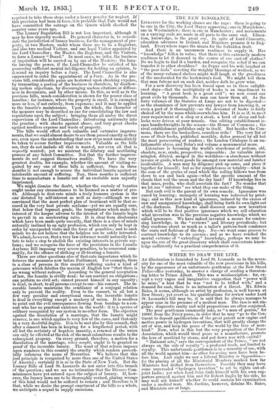THE NEW IGNORANCE.
Lmn_inrEs for the working classes are the rage : there is going to be one in the City, the Lord Mayor approving ; one in Marylebone, one in 'Westminster ; there is one in Manchester ; and movements on a varying scale are made in all parts to the same end. Educa- tion, knowledge, is the great cry. In spite of Lord Clancarty, education advances in Ireland, and Ministers promise it to Eng- land. Everywhere rages the mania for the forbidden fruit.
And there is an uncommon readiness to supply it. Has " knowledge " fallen in value, that there is this extremely modern readiness to let it descend in the course of our cast-off clothes ? Do we begin to find it a burden, and recognize the relief if we can transfer it to other shoulders ? As Pepys and his wife laughed at "the poor fools" coveting the weighty blessings of wedlock, so we of the many-volumed shelves might well laugh at the greediness of the uneducated for the bookworm's food. We might tell them that man fattens not on such diet, neither doth he grow wise.
For a new discovery has been forced upon us in these enlight- ened days—that the multiplicity of books is an impediment to learning. "A great book is a great evil"; we now count our great evils by thousands. No man can know them all. As the forty volumes of the Statutes at Large are not to be digested— as the abundance of law prevents any lawyer from knowing it, or even a part of it thoroughly—so the devourer of books is fairly choked off by the mass which overwhelms him. It is as if, to meet your requirement of a chop or a steak, a herd of sheep and bul- locks were driven at your muzzle. One editing establishment is- sues hundredweights in the season—the House of Commons ; the rival establishment publishes only to itself. But besides the Com- mons, there are the booksellers, countless tribe ! The very list of some of their books, published monthly, defies perusal by all but the most persevering of readers ; the London Catalogue is an un- fathomable abyss, and Bohn's red volume a monumental maze.
Literature is becoming the world's storehouse of notions, old, obsolete, new, crude, prospective, impossible ; .he valuable inter- mingled, diluted, merged in the worthless—a storehouse without invoice or guide, where goods lie amongst raw material and lumber incalculable. A man may by diligence pick up some, and piece it together for himself; but as for completeness or totality—what is the sum of the grains of sand which the rolling billows toss from shore to sea and back again—what the specific amount of the clouds that veil the ocean and the dry land ? If knowledge lies in that mass, perdu, who shall ascertain the fact ? No wonder that we let our " inferiors" see what they can make of the thing.
But each evil is the parent of its own remedy. Ignorance was cured by learning ; monopoly of learning was redressed by print- ing; and so this new kind of ignorance, induced by the excess of raw and unorganized knowledge, shall bring forth its own light out of the darkness. Perhaps we shall discover some new invention which will be to that positive ignorance which we call education what invention was to the previous negative knowledge which we called ignorance. We have indeed invented a means for conden- sing knowledge, in the "reviews" and literary periodicals; but they condense about as much as a tailor's pattern-book condenses the coats and fashions of the day. No—we want some process to contract knowledge to its essence ; and as we have reached the mortal extreme of "extending" knowledge, perhaps we may be upon the eve of the great discovery which shall concentrate know- ledge sufficiently for a practical comprehension of it.


























 Previous page
Previous page